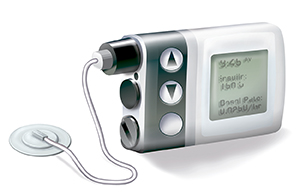A
B
C
D
E
F
G
H
I
J
K
L
M
N
O
P
Q
R
S
T
U
V
W
X
Y
Z
Click a letter to see a list of medical procedures beginning with that letter.
Click 'Back to Intro' to return to the beginning of this section.
Insulin Pump Use
Can anyone with diabetes use an insulin pump? Insulin pumps are used most often by people with type 1 diabetes. But some people with type 2 diabetes also use them. Insulin pumps can be used instead of giving insulin by injection. The FDA allows children as young as age 2 to use certain insulin pumps.
These small devices clip to your clothing or attach directly to your body. The pump delivers insulin through a tube (catheter) attached to your skin, often on the belly, thigh, or buttock. It delivers a continuous (basal) dose of insulin 24 hours a day. Before a meal, you push a button to give yourself a spike of insulin for food. Supplemental or correction doses may be used to treat high glucose levels, if needed.

Pumps are useful for people who already take insulin but still don't have good glucose control. Using a pump takes a lot of training. They are not for everyone. You must work closely with a diabetes specialist, watch your blood glucose, count carbohydrates, and keep food records. But it may be worth thinking about if you take insulin and still have trouble with glucose control. And if you're committed to better diabetes management. It may be expensive. But it is much more convenient for some people who need 4 or more insulin injections daily.
New insulin pump models and similar systems are becoming available all the time. One of these newer pump models may have a feature that is just right for you, such as a lower basal insulin rate during exercise. Or a pump may be connected to a monitor that also checks your blood sugar. It makes changes based on your blood sugar values. Your diabetes educator may help you try several types until you find one that works well for you.
Online Medical Reviewer:
Raymond Kent Turley BSN MSN RN
Online Medical Reviewer:
Robert Hurd MD
Online Medical Reviewer:
Ronald Karlin MD
Date Last Reviewed:
2/1/2023
Copyright ©2025 HealthDay. All rights reserved.